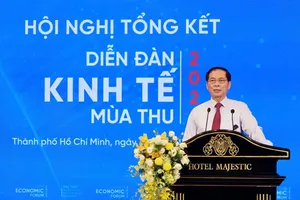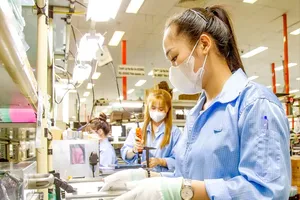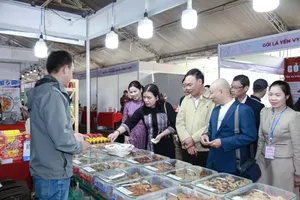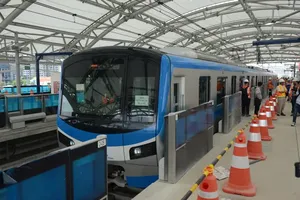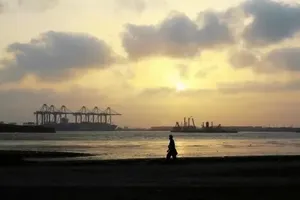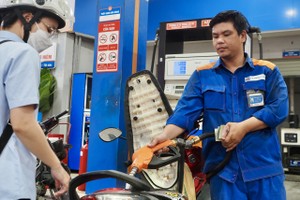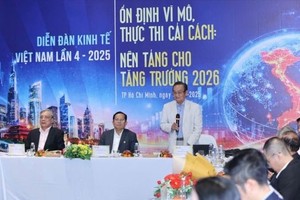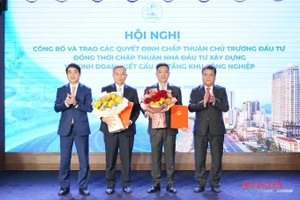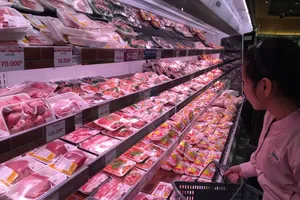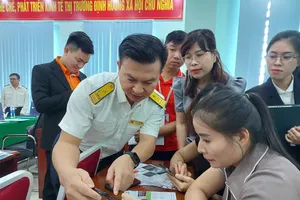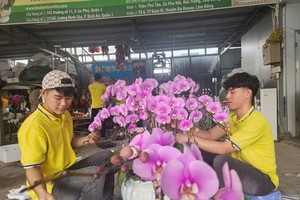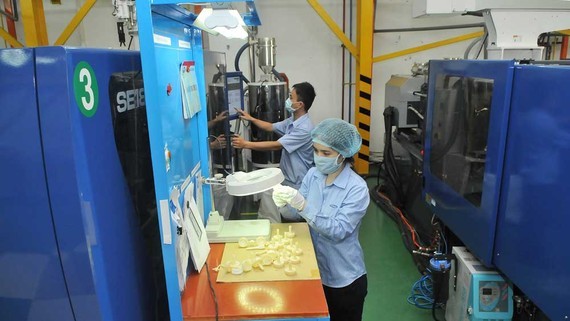 Producing plastic equipment on environmentally friendly production lines with low energy consumption at Saigon Industry Corporation. (Photo: SGGP)
Producing plastic equipment on environmentally friendly production lines with low energy consumption at Saigon Industry Corporation. (Photo: SGGP)
Increasing demand for electricity
According to the Ministry of Industry and Trade (MoIT), it is forecasted that in the next five years, electricity demand will still grow at about 8.5 percent per year. However, according to the assessment of the MoIT and the Electricity of Vietnam (EVN) on the power supply plan for the 2020-2025 period, ensuring electricity supply in this period will face many difficulties and challenges, especially in the case of extreme weather events. The national capacity reserve rate by 2025, excluding renewable energy, is only about 18 percent. Specifically, the reserve ratio of the Southern power system will decrease sharply from 2023, and there will be insufficient electricity in 2025. In the North, the reserve ratio in 2025 will be only 10 percent. Notably, according to EVN's updated report on the balance of electricity supply and demand in the 2021-2025 period, the shortfall in power output may reach 27.7 billion kWh by 2025.
Ho Chi Minh City is a densely populated urban area and has many businesses operating in production and business. Statistics from the Department of Industry and Trade also show that the demand for energy in HCMC is huge. The city consumes about 25 billion kWh of electricity each year, accounting for about 10 percent of the whole country. Consuming a lot of energy not only potentially causes electricity shortages, but also emits a lot of greenhouse gases into the environment, causing climate change. Therefore, to cope with the challenge of energy security, as well as realize the goal of reducing greenhouse gas emissions, it is extremely urgent to encourage the economical and efficient use of energy in the production and business process.
Saving - a national policy
According to calculations by the World Bank, the cost of saving one unit of energy is only a quarter of the cost to produce one more unit of energy. Therefore, the world always considers the economical and efficient use of energy as the top priority solution. Developing according to this trend, HCMC, in particular, and Vietnam, in general, are also promoting solutions to propagate and encourage the economical and efficient use of energy in various economic sectors and fields.
According to Mr. Vo Van Hoan, Vice Chairman of the People's Committee of HCMC, the economical and efficient use of energy in the activities of the society and key energy users, contributing to ensuring energy security towards sustainable development has always been paid attention to by the city. The city also offers many solutions and key tasks to accomplish this goal. Accordingly, the city has requested units, departments, and agencies to promote propaganda, raise awareness, and mobilize the community to boost the economical and efficient use of energy; develop and popularize high-efficiency and energy-saving equipment, and gradually eliminate low-efficiency products and equipment; assist energy users in conducting energy audits, survey, identify energy savings potential and build energy management models at facilities to optimize the production process, save energy, and overcome wasteful use of energy. In addition, the city requested to promote energy efficiency in buildings.
From a business perspective, Ms. Ly Thi Phuong Trang, Chairman of the Board of Directors of Daikin Vietnam, said that since 2000, the company had implemented a program to introduce energy-saving machines with inverter-saving energy technology. Daikin Company is also a pioneer of the Energy Labeling Program chaired by the Ministry of Industry and Trade for more than ten years.
Mr. Phuong Hoang Kim, Director of the Department of Energy Saving and Sustainable Development under the Ministry of Industry and Trade, said that the economical and efficient use of energy plays an important role in ensuring national energy security, contributing to the implementing Vietnam's commitments at the COP26 Climate Change Summit. To achieve the goal of saving from 5 percent to 7 percent of the total energy consumption of the country by 2025 and from 8 percent to 10 percent by 2030, the MoIT will continue to coordinate with relevant ministries, agencies, and units to develop a plan to implement the National Program on the economical and efficient use of energy in the 2021-2025 period in 63 provinces and cities. The program proposes comprehensive and synchronous solutions in the development, consolidation, and strong enforcement of legal regulations on the economical and efficient use of energy; establishes mechanisms of incentives, encouragement, and technical and financial support to promote the application of energy-saving solutions in all aspects of the economy and the whole society.
According to the Ministry of Industry and Trade (MoIT), it is forecasted that in the next five years, electricity demand will still grow at about 8.5 percent per year. However, according to the assessment of the MoIT and the Electricity of Vietnam (EVN) on the power supply plan for the 2020-2025 period, ensuring electricity supply in this period will face many difficulties and challenges, especially in the case of extreme weather events. The national capacity reserve rate by 2025, excluding renewable energy, is only about 18 percent. Specifically, the reserve ratio of the Southern power system will decrease sharply from 2023, and there will be insufficient electricity in 2025. In the North, the reserve ratio in 2025 will be only 10 percent. Notably, according to EVN's updated report on the balance of electricity supply and demand in the 2021-2025 period, the shortfall in power output may reach 27.7 billion kWh by 2025.
Ho Chi Minh City is a densely populated urban area and has many businesses operating in production and business. Statistics from the Department of Industry and Trade also show that the demand for energy in HCMC is huge. The city consumes about 25 billion kWh of electricity each year, accounting for about 10 percent of the whole country. Consuming a lot of energy not only potentially causes electricity shortages, but also emits a lot of greenhouse gases into the environment, causing climate change. Therefore, to cope with the challenge of energy security, as well as realize the goal of reducing greenhouse gas emissions, it is extremely urgent to encourage the economical and efficient use of energy in the production and business process.
Saving - a national policy
According to calculations by the World Bank, the cost of saving one unit of energy is only a quarter of the cost to produce one more unit of energy. Therefore, the world always considers the economical and efficient use of energy as the top priority solution. Developing according to this trend, HCMC, in particular, and Vietnam, in general, are also promoting solutions to propagate and encourage the economical and efficient use of energy in various economic sectors and fields.
According to Mr. Vo Van Hoan, Vice Chairman of the People's Committee of HCMC, the economical and efficient use of energy in the activities of the society and key energy users, contributing to ensuring energy security towards sustainable development has always been paid attention to by the city. The city also offers many solutions and key tasks to accomplish this goal. Accordingly, the city has requested units, departments, and agencies to promote propaganda, raise awareness, and mobilize the community to boost the economical and efficient use of energy; develop and popularize high-efficiency and energy-saving equipment, and gradually eliminate low-efficiency products and equipment; assist energy users in conducting energy audits, survey, identify energy savings potential and build energy management models at facilities to optimize the production process, save energy, and overcome wasteful use of energy. In addition, the city requested to promote energy efficiency in buildings.
From a business perspective, Ms. Ly Thi Phuong Trang, Chairman of the Board of Directors of Daikin Vietnam, said that since 2000, the company had implemented a program to introduce energy-saving machines with inverter-saving energy technology. Daikin Company is also a pioneer of the Energy Labeling Program chaired by the Ministry of Industry and Trade for more than ten years.
Mr. Phuong Hoang Kim, Director of the Department of Energy Saving and Sustainable Development under the Ministry of Industry and Trade, said that the economical and efficient use of energy plays an important role in ensuring national energy security, contributing to the implementing Vietnam's commitments at the COP26 Climate Change Summit. To achieve the goal of saving from 5 percent to 7 percent of the total energy consumption of the country by 2025 and from 8 percent to 10 percent by 2030, the MoIT will continue to coordinate with relevant ministries, agencies, and units to develop a plan to implement the National Program on the economical and efficient use of energy in the 2021-2025 period in 63 provinces and cities. The program proposes comprehensive and synchronous solutions in the development, consolidation, and strong enforcement of legal regulations on the economical and efficient use of energy; establishes mechanisms of incentives, encouragement, and technical and financial support to promote the application of energy-saving solutions in all aspects of the economy and the whole society.
According to EVN's calculations, currently, industries account for more than 47 percent of total national energy consumption, with an energy savings potential of up to 30-35 percent. If enterprises practice using energy economically and efficiently to save at least 2 percent of electricity consumption per year, on average, the whole country will save 1.4 billion kWh per year.





